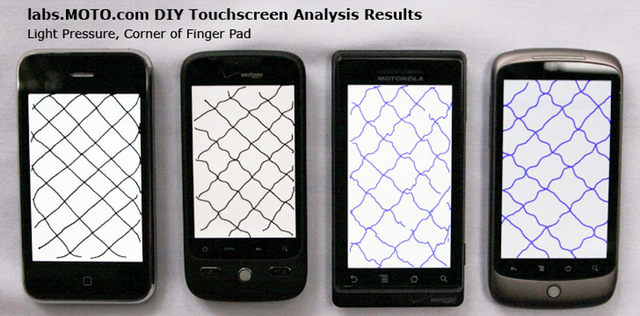
Touchscreens are becoming increasingly common in consumer-level smartphones, but they work more smoothly in some phones than others. MOTO, a company that develops products and services for startups (and has done some work on capacitive touch), recently did some touchscreen analysis on a handful of smartphones and found that the iPhone had some of the best screen/software integration of the bunch.
MOTO noted in its post that good touchscreens require seamless integration between hardware, software, and UI, and that the user will undoubtedly suffer if a manufacturer decides to cut corners in this process. To test this, MOTO performed a line test as a way to see how well these elements were integrated—the goal is to see how smooth and straight the lines are when you draw them slowly with your finger. "On inferior touchscreens, it’s basically impossible to draw straight lines," the company wrote. "Instead, the lines look jagged or zig-zag, no matter how slowly you go, because the sensor size is too big, the touch-sampling rate is too low, and/or the algorithms that convert gestures into images are too non-linear to faithfully represent user inputs."
The results of the test showed the iPhone performing the best of the four phones tested (the Android phones included the HTC Android Eris, Motorola Droid, and Google Nexus One). This was the case both with a light touch and also with some moderate pressure. The three Android phones all showed varying degrees of waviness with light pressure—a symptom of poor finger tracking, MOTO says—but the Android Eris and Nexus One showed much smoother lines with medium finger pressure.
The iPhone was not the champion on everything, though; MOTO said that it showed some sensitivity problems around the edges of the screen (particularly on the bottom), while the Nexus One was the "clear winner" on edge performance. (The Eris didn't do so poorly here either, as it was the original winner before the team tested the Nexus One.)
MOTO says that the touchscreen performance is particularly important because it will determine how accurate a touchscreen keyboard performs, among numerous other tasks. Though the Motorola Droid has gotten overall good reviews, it looks like it has a ways to go in terms of touchscreen accuracy, even when compared to other Android phones.
reader comments
33